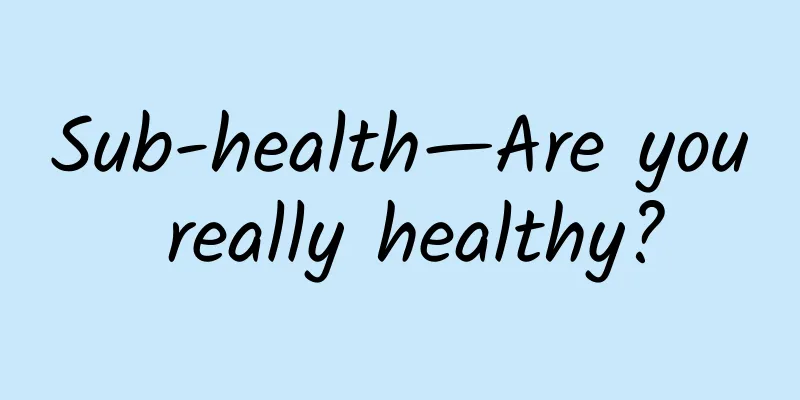Sub-health—Are you really healthy?

|
This is the 4360th article of Da Yi Xiao Hu With the development of society, people are under increasing pressure in life and work. Under long-term oppression, they have developed many bad living habits, which have gradually led to the decline of the functions of some human organs. The body begins to show symptoms of fatigue, lack of energy, muscle and joint pain, palpitations, chest tightness, dizziness, headache, insomnia, forgetfulness and other discomforts. Sub-health has gradually become a common visitor in daily life. 1.What is sub-health? Sub-health refers to a state of the human body between health and disease. People in a sub-healthy state cannot reach the standard of health, and show symptoms of reduced vitality, decreased function and adaptability for a certain period of time, but do not meet the clinical or sub-clinical diagnostic standards of modern medicine for related diseases. 2. Types of sub-health According to the clinical manifestations of sub-health status, it can be divided into the following categories: ① Mainly manifested by physical symptoms such as fatigue, sleep disorders, or pain; ② Mainly characterized by depression, restlessness, irritability, fear, or decreased short-term memory and inability to concentrate; ③The main manifestations are decreased social adaptability, such as reduced frequency of interpersonal interactions or tense interpersonal relationships. If any of the above three symptoms persists for more than three months and a systematic examination excludes diseases that may cause the above symptoms, the patient can be judged as being in a state of physical sub-health, psychological sub-health, and social sub-health. Clinically, the above three sub-health symptoms often occur simultaneously. 3. Causes of sub-health The main causes of sub-health are: unreasonable diet, irregular work and rest, lack of sleep, mental tension, high psychological pressure, long-term negative emotions, etc. 4. Symptoms of sub-health Physical symptoms include fatigue, muscle and joint pain, dizziness, headache, palpitations, chest tightness, sleep disorders, loss of appetite, abdominal discomfort, loose stools, constipation, sexual dysfunction, fear of cold or heat, susceptibility to colds, dry eyes, etc. Psychologically, symptoms include depression, restlessness, irritability, fear, memory loss, inability to concentrate, lack of energy, slow reaction, etc. In terms of social interaction, it may manifest itself in the inability to assume corresponding social roles well, difficulties in work and study, inability to handle interpersonal and family relationships properly, difficulty in engaging in normal social interactions, etc. 5. Harm of sub-health Sub-health is a critical state. Although people in sub-health state do not have clear diseases, they have a decline in mental vitality and adaptability. If this state cannot be corrected in time, it is very easy to cause psychosomatic diseases, including: psychological disorders, gastrointestinal diseases, hypertension, coronary heart disease, cancer, sexual dysfunction, fatigue, lack of concentration, irritability, insomnia, poor digestion, loss of appetite, abdominal distension, palpitations, chest tightness, constipation, abdominal dirt, feeling very tired or even feeling like dying. However, the physical examination showed no organ problems, so it was mainly a functional problem. People in a sub-healthy state, except for fatigue and discomfort, are not in danger of life. However, if they encounter high stimulation, such as staying up late, losing temper and other stressful conditions, they are prone to sudden death, which is "death from overwork." "Death from overwork" is a comprehensive disease. It means that during the working process under non-physiological conditions, a person's normal work and life patterns are disrupted, fatigue accumulates in the body and turns to an overwork state, causing high blood pressure, aggravated arteriosclerosis, and eventually leading to a fatal state. 6. Which group of people are prone to sub-health? According to the survey, sub-health has certain differences in different genders, ages, and occupations, and has nothing to do with birthplace and ethnicity. Most patients in sub-health are between 18 and 45 years old, and are more common in urban long-term workers. The incidence rate of women is generally higher than that of men. The 40-50 age group is more likely to be affected than other age groups, and teachers and civil servants are more likely to be affected. 7. How to determine whether you are suffering from sub-health? 1. Unexplained, persistent or recurrent chronic fatigue assessed by clinical assessment, which is new or has a clear onset time, is not congenital, is not caused by the work being done, is not obvious after rest, and the patient's occupational ability, educational ability, social ability and personal life have substantially declined compared to before the onset of the disease; 2. At least 4 of the following symptoms occur simultaneously, not before fatigue symptoms appear, and the symptoms persist or recur for at least 6 consecutive months: (1) Significant decline in short-term memory or concentration; (2) Sore throat; (3) Swollen lymph nodes in the neck or armpits; (4) Muscle pain; (5) Pain in multiple joints, but not accompanied by redness or swelling; (6) Headache, but the type, pattern and severity of the attack are different from the past; (7) Failure to regain energy after sleep; (8) Post-exercise discomfort persists for more than 24 hours. 8. How to treat sub-health? 1. Pay attention to your diet Comprehensive and balanced nutrition, eat more foods rich in vitamins, high-quality protein, minerals, such as milk, lean meat, eggs, chicken, fish, etc. Food should be light and easy to digest, with less oil and salt, and quit smoking and drinking. 2. Exercise Avoid sitting or lying for long periods of time. Improve your overall physical fitness through exercise. You can make a reasonable exercise plan half an hour after a meal and ensure more than 30 minutes of moderate-intensity exercise every day, such as running, cycling, playing ball, etc. At the same time, develop a good life schedule, avoid staying up late for long periods of time, combine work and rest at work, and don't overwork. 3. Cultivate multiple interests and maintain vigorous energy A wide range of hobbies can benefit people greatly, not only can they cultivate their character, but also can assist in the treatment of some mental illnesses; 4. Mental health and being kind to stress Treat stress as an integral part of life and work, learn to reduce stress appropriately, and maintain a healthy and positive mentality. 5. Physical therapy Physical methods such as acupuncture, massage, hot compress, bathing, guided gymnastics, and drug fumigation are adopted, as well as medium-frequency electrotherapy, infrared therapy, biofeedback, hydrotherapy, etc.; 6. Medication People who are prone to getting angry can take medicines that clear away heat and detoxify, such as honeysuckle, forsythia, andrographis paniculata, isatis root, isatis indigotica, etc., which can reduce the fire in the heart. People with heavy moisture in the body can take Poria cocos, Atractylodes macrocephala, Coix seeds, etc., or take Chinese patent medicines such as Lizhong Pills or Fuzi Lizhong Pills, which can remove moisture. Patients with qi deficiency can take medicines such as Shengmai Yin and Huangqi Granules to enhance their body immunity. 7. Regular physical examinations People with sub-health should pay attention to physical examinations, assess whether there are any health risks, change their unhealthy lifestyles in a timely manner, and block the development of the disease. Foods for different sub-health conditions: When you suffer from insomnia, irritability and forgetfulness : Eat more foods containing calcium and phosphorus, such as soybeans, fresh oranges, spinach, chestnuts, grapes, potatoes, etc. When you are exhausted : Eat peanuts, almonds, cashews, walnuts and other dried fruits that are rich in protein, vitamin B, calcium, iron and plant fats. When the brain is tired : eat nuts, such as peanuts, melon seeds, walnuts, pine nuts, hazelnuts, and torreya grandis. When the psychological pressure is too great : eat foods containing vitamin C, such as broccoli, spinach, young rapeseed, fruits (tangerines, tangerines, oranges, strawberries, mangoes), etc. Poor memory, forgetfulness : Eat foods rich in vitamin C and A, such as peppers, bamboo shoots, carrots, red dates, cabbage, etc. Increase the amount of vegetables and fruits in the diet, eat less meat and other acidic foods, and drink green tea. Author: Shanghai University of Traditional Chinese Medicine, School of Rehabilitation Medicine Rehabilitation Physiotherapy Chen Yujing 2022401002 |
<<: Health is always the best gift for mother!
>>: If HPV is negative, do we not need to consider cervical cancer?
Recommend
How to get rid of crow's feet?
Women dress up to please themselves. Women in anc...
What are the reasons for light menstrual flow after medical abortion?
The development of medical technology in modern l...
Is back pain due to pregnancy?
Many women have no experience because it is their...
Is it normal not to get pregnant after six months of marriage?
It is normal not to get pregnant after six months...
At what age do people usually reach menopause?
Women generally do not go through menopause sudde...
Fetal weight growth chart in late pregnancy
Many pregnant parents are very concerned about th...
[Health Information] 14 tips for women's health, very practical.
1. Don’t be too clean Through research, American ...
Best time for women to conceive
As the Chinese say, there are three types of unfi...
What does the endometrial line mean?
When many women have a reproductive system ultras...
How does general anesthesia affect children?
General anesthesia is a medical procedure that us...
What should I do if wisdom teeth grow during pregnancy?
The age at which wisdom teeth grow is different f...
Is it harmful to run during menstruation?
According to traditional cognition, there are man...
Pregnant women have green stools after taking iron supplements
At each stage of pregnancy, the nutrients that th...
Will you have your period one month before pregnancy?
As long as there is no problem with the body, men...
“Zombie deer disease” may be transmitted to humans. How should we deal with it?
"Zombie deer disease" has appeared in t...









